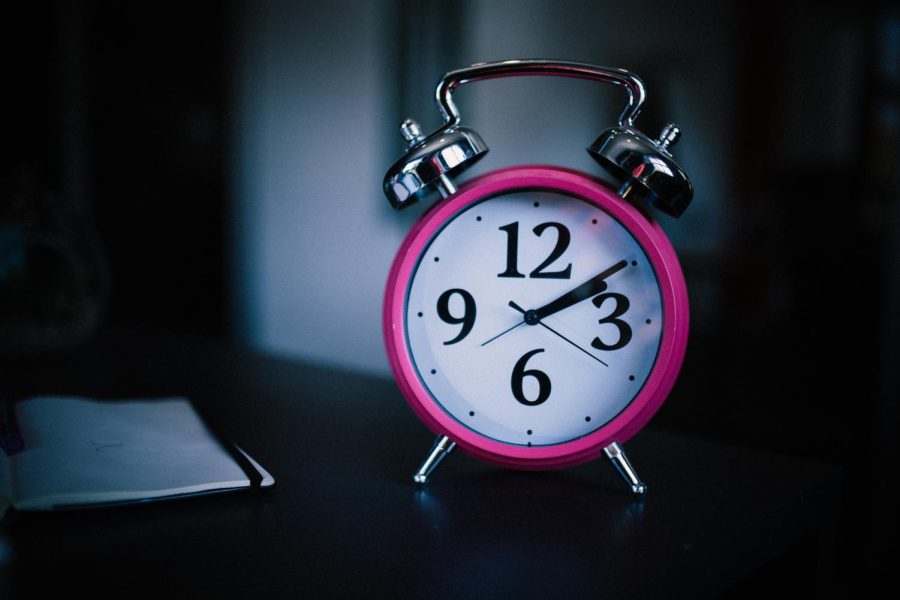Why it’s Difficult for Teens to Sleep
A pink alarm clock on the bedside.
January 26, 2023
After a long day of homework and studying, you flop on the bed. You close your eyes for a few minutes and… are jolted by the sound of your alarm clock. You feel as though you haven’t slept for more than an hour, yet it is time for school again.
One of the most important things in life is sleep; and it is something that adolescents tend to miss out on, especially when they are in high school. All the work piling up with the due dates getting too close for comfort, activities pulling people in different directions, and family responsibilities add up to all-nighters and studying just to at least get a passing grade.
According to The Centers for Disease Control and Prevention, the amount of sleep hours a person needs is based on their age. Ages 6 to 12 should sleep from 9 to 12 hours per night. While ages 13 to 18 years should get 8 to 10 hours. So the younger you are, the more hours you need, which explains why babies – who it is recommended sleep for 14 to 17 hours – sleep for long periods of time. While significant sleep is required, evidence shows that teens, in particular, do not get the sleep they need. In a national sample, 7 out of 10 high school students do not get enough sleep. Concerningly, that is more than 50 percent, which could explain the mental pain kids often feel when going to school after a lack of sufficient sleep.
So why do adolescents lose sleep hours? There’s more than one reason why; but the main reasons, according to the American Academy of Pediatrics, are the stress of assignment deadlines and the overuse of technology. The interest of social media, mobile games, fanfictions, and other online distractions tend to cause teenagers to overlook the need for sleep. It’s quite common to stay up late on the phone to see the latest trends on TikTok or Instagram. It also takes attention away from important tasks such as chores and assignments, and, to an extent, explains why teens don’t usually do their homework until it’s almost due.
Theresa Kabasela, a junior at Paint Branch, says that her phone has impacted her sleep and that this, in turn has affected her class time ¨It’s hard to focus and honestly I space out easily,¨ she notes.
According to Busra Elkatmis‘s article “Spend a lot of time online? It may affect your sleep” for Sciworthy, “overuse of the internet can cause impaired sleep quality and shortened sleep duration. Internet overuse can also cause prolonged sleep latency, which is the period of time between being awake and sleeping.¨ Late assignments with nearing deadlines also play a part in this. Projects and assignments that are important to someone’s grade can push a person to their limits.
Rosa Guzman, a sophomore at PB says she has a difficult time going to sleep early and staying awake in class. ¨There aren’t many times when I’ve had to stay up late for an assignment; but when it does happen, it tends to make me wake up late and it affects my activeness in the classroom.¨
It’s clear to see how academic stress and internet overuse affect a teenager’s circadian rhythm. The circadian rhythm is a natural, internal process that regulates the sleep–wake cycle and repeats roughly every 24 hours. In easier words, it’s the cycle of your sleeping and waking up time in a day. This is very important for adolescents, whose circadian rhythms run contrary to school start times. According to the Department of Psychiatry from the University of Pittsburgh, in teens ¨Circadian rhythms naturally become delayed, leading to later sleep and wake times; the drive to sleep that accumulates during periods of wakefulness takes longer to build; and sensitivity to the phase-shifting effects of light increases.¨
Maryanne Agyei-Obese, another junior at PB, may be an example of one who has been impacted by this circadian rhythm shift. Maryanne says that she has a difficult time staying up in class and adds, ¨I don’t feel like I have a lot of energy. I feel so tired that I just wanna fall asleep in class and I don’t wanna do any work.¨
The University of Pittsburgh also states that ¨teenagers experience environmental changes such as greater exposure to light from electronic devices at night and earlier school start times, as well as social pressures to stay up later.¨ All of this combines to cause teenagers to have their sleep schedules quite messy. However, there are ways for better sleep like eliminating electronics from the bedroom, not procrastinating on big tasks (like homework and big projects), sticking to sleep-friendly routines, and using natural supplements like melatonin to aid in sleep.













































Doug Canter • Jan 26, 2023 at 3:40 PM
Awesome article Bethel! Great work. Keep the articles coming.